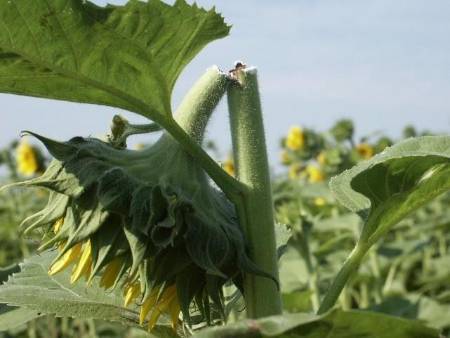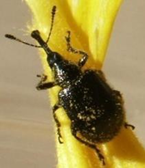Sunflower Head Clipping Weevil

This little insect is remarkable, even if the damage it causes ruins magnificent sunflowers. The sunflower head clipping weevil is a black weevil about 1.0 cm (1/3 inches) long with a long, curved snout and relatively soft wing covers. Typically, you won't see the weevil until they have started to cause damage to the sunflowers. The adults girdle flower peduncles and leaf petioles, leaving partially severed flowers or leaves hanging on the plant, similar to the picture on the right. When severed flower heads are opened, they often reveal mating aggregations of adult weevils covered in pollen. This insect is easy to diagnose because of the distinctive damage caused to the sunflower. There is only one generation of this insect in a given year, and adults typically start showing up when sunflowers mature in late July to early August.
Treatment for these weevils depends on the amount of damage they are causing. You should be sure to collect all of the clipped heads and dispose of them in the dumpster or burn them. The weevil larvae develop in the decomposing head after it is clipped, and then they leave to overwinter in the soil. By removing all clipped heads, you can help get the population lower next year and onward. If there are just a few, it's best to leave them alone; however, if they are causing significant damage to your sunflowers, you can spray them. Any generic insect/garden spray will kill the weevils; the trick is only to spray the back of the heads of the sunflower, which is where the weevils will be found. If you spray the front, you won't get any control since the weevils won't be able to handle the spray. I would also spray in the early to late evening when pollinators are less likely to visit the flowers.
collect all of the clipped heads and dispose of them in the dumpster or burn them. The weevil larvae develop in the decomposing head after it is clipped, and then they leave to overwinter in the soil. By removing all clipped heads, you can help get the population lower next year and onward. If there are just a few, it's best to leave them alone; however, if they are causing significant damage to your sunflowers, you can spray them. Any generic insect/garden spray will kill the weevils; the trick is only to spray the back of the heads of the sunflower, which is where the weevils will be found. If you spray the front, you won't get any control since the weevils won't be able to handle the spray. I would also spray in the early to late evening when pollinators are less likely to visit the flowers.

Have questions? Contact our office where our Horticulture Extension Agent will assist you with questions.
Phone: (316) 321-9660
Email: callae@ksu.edu